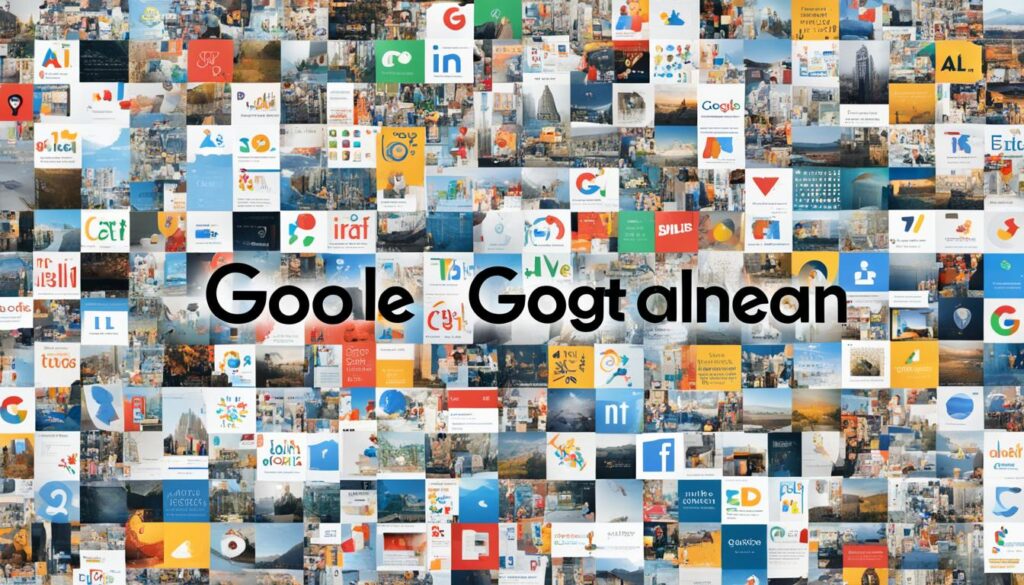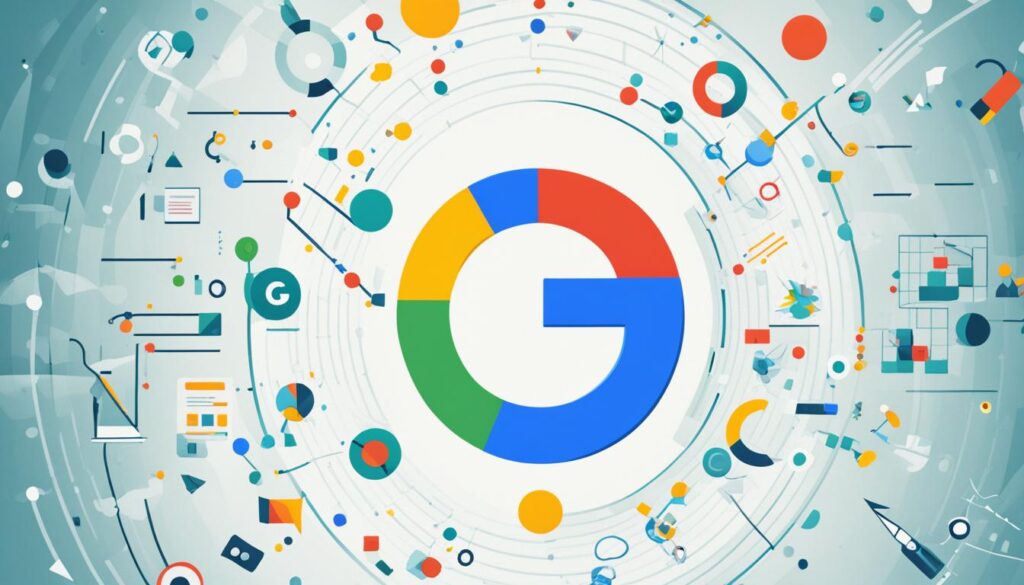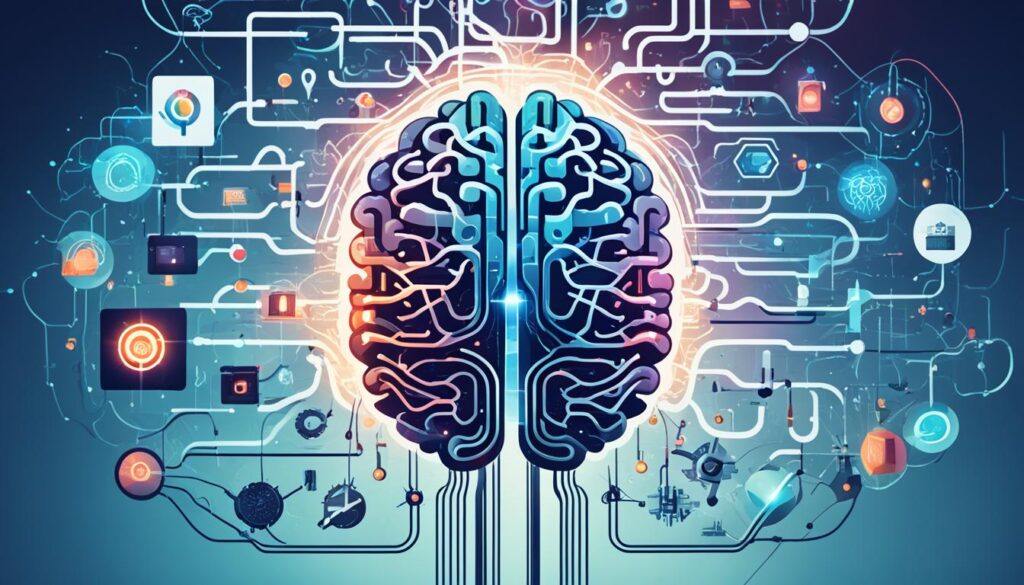Did you know that over 30% of online content is generated by artificial intelligence (AI)?
AI has revolutionized content creation, allowing businesses to produce vast amounts of written material quickly and efficiently. However, this surge in AI-generated content has presented a challenge for Google, the world’s largest search engine.
While Google has adapted its approach to focus on content quality rather than its production method, there is still a significant amount of low-quality AI content flooding search results. This raises questions about Google’s ability to accurately evaluate the value and relevance of AI-generated content.
In this article, we’ll explore the prevalence of AI-generated content, Google’s ability to determine content quality, its perspective on AI content creation, and the importance of people-first content. We’ll also delve into the future of AI-generated content and provide insights on optimizing SEO content with AI.
Key Takeaways:
- Over 30% of online content is generated by AI.
- Google faces challenges in detecting and handling AI-generated content.
- Google’s focus is on content quality rather than how it is produced.
- There is a discrepancy between Google’s claims of determining content quality and real-world experiences.
- Google considers AI-generated content as spam and may penalize it.
The Prevalence of AI-Generated Content
AI-generated content is on the rise and can be found all over the internet, including in Google search results. In recent years, Google has shifted its perspective on AI-generated content, moving away from considering it as spam and putting more emphasis on content quality. However, this shift has had unintended consequences, leading to an influx of low-quality AI content that floods search results. While Google strives to protect searchers from spam, the prevalence of AI-generated content remains a concern.
Google indexes only a fraction of the vast online content available. While the search engine takes measures to filter out spam, AI-generated content presents a new challenge. The algorithms that detect spam are constantly evolving, but they may not yet fully comprehend the intricacies of AI-generated content. As a result, some spammy AI-generated content may slip through the cracks and appear in search results.
To better understand the prevalence of AI-generated spam, it is important to analyze and assess the effectiveness of Google’s spam detection algorithms. By doing so, we can gain valuable insights into the impact of AI-generated content and its relationship to search engine optimization.
How AI-generated spam impacts search results
The abundance of low-quality AI-generated content can have several implications for search results. It can dilute the quality and relevance of search results, making it harder for users to find trustworthy and valuable information. Additionally, the presence of spammy AI-generated content can negatively affect user experience and erode trust in the reliability of search engines.
Furthermore, the prevalence of AI-generated spam raises questions about the future of content creation and the role of AI in shaping search engine rankings. As AI technology continues to advance, it is crucial for search engines like Google to develop more sophisticated algorithms to identify and filter out spammy AI-generated content.
The ongoing battle against AI-generated spam
Search engines are continuously working to improve their spam detection algorithms in order to combat the rise of AI-generated spam. Google is investing resources in training its algorithms to better detect and filter out low-quality AI-generated content. However, it is a complex challenge due to the ever-evolving nature of AI technology.
Balancing the search engine’s ability to identify and penalize AI-generated spam with the need to avoid false positives poses a unique challenge. Striking the right balance is crucial to maintaining the integrity of search results and ensuring a positive user experience. Google’s ongoing efforts to address AI-generated spam are essential to the future of search engine optimization and content quality online.
The importance of vigilance and user feedback
While search engines like Google are taking proactive steps to combat AI-generated spam, user feedback remains a crucial component in identifying and addressing spammy content. Users are encouraged to report any suspicious AI-generated content they encounter in search results, helping search engines improve their algorithms and keep pace with evolving techniques used by spammers.
By staying vigilant and engaging in ongoing dialogue with search engines, users can play a vital role in fighting against the prevalence of AI-generated spam and ensuring the quality and relevance of search results.
| Impact of AI-Generated Spam | Challenges | Solutions |
|---|---|---|
| Dilutes search result quality | Complex nature of AI-generated spam detection | Investment in improved algorithms |
| Negative impact on user experience | Balance between avoiding false positives and spam detection | User feedback and ongoing algorithm training |
| Erodes trust in search engine reliability | Constantly evolving AI technology | Engaging users in reporting suspicious content |

Google’s Ability to Determine Content Quality
Despite Google’s claims of being proficient at evaluating content quality, it continues to face challenges in distinguishing between good and great content. Many SEOs and website managers have observed instances where inferior content outranks superior content in search results. While Google has made progress in eliminating low-quality content from its index, there is still room for improvement when it comes to accurately assessing content quality.
Google has openly acknowledged that it does not possess a complete understanding of documents and relies on user interactions on search engine results pages (SERPs) to gauge content quality. The search engine prioritizes user feedback, such as click-through rates, time spent on a page, and bounce rates, to assess the relevance and usefulness of content to searchers.
“While Google has eliminated a significant amount of low-quality content from its index, it still faces challenges in distinguishing good content from great content.”
This reliance on user interactions is both a strength and a limitation for Google. On one hand, it allows the search engine to gather real-time feedback from users to inform its algorithms. On the other hand, it may lead to biased results as user behavior can be influenced by various factors. Additionally, Google’s algorithms may not always accurately capture the nuances of content quality, which can result in the promotion of subpar content over more valuable resources.
Furthermore, the rise of AI-generated content has posed new challenges for Google. As AI tools become more sophisticated, it becomes increasingly difficult for Google to differentiate between content produced by humans and by AI. This can result in AI-generated content that lacks depth or originality ranking higher than content created by experts in the field.
To address these challenges, Google constantly updates its algorithms to refine its understanding of content quality and improve its ability to rank high-quality content. However, website managers and content creators should also take an active role in ensuring their content adheres to Google’s guidelines for quality content, such as expertise, authoritativeness, and trustworthiness (E-A-T).
The Importance of User Interaction Metrics
| Metric | Description |
|---|---|
| Click-through rate (CTR) | The percentage of users who click on a search result after seeing it on a SERP. |
| Time spent on page | The average amount of time users spend on a webpage before returning to the SERP or navigating elsewhere. |
| Bounce rate | The percentage of users who leave a webpage without interacting further with the site. |

While user interaction metrics provide valuable insights into content quality, they are not the sole determinants of a webpage’s value. Content creators should strive to produce high-quality, informative, and engaging content that satisfies the needs and expectations of their target audience. By focusing on creating content that resonates with users and aligns with Google’s evolving quality guidelines, website managers can enhance their chances of ranking well in search results.
Google’s View on AI-Generated Content
Google takes a firm stance on AI-generated content, considering it spam that goes against its webmaster guidelines. Content produced by machines, also known as auto-generated content, is not favored by Google and can lead to manual penalties. The search engine’s systems may not be capable of detecting AI-generated content without human reviewers’ assistance. While there might be practical applications for AI writing tools, generating content using these tools is still considered spam according to Google’s guidelines.
The Challenge of AI-Generated Content Detection
Google faces significant challenges in distinguishing AI-generated content from human-created content. The increasing sophistication of AI writing tools has made it difficult to differentiate between the two. Despite Google’s efforts to combat spam, the prevalence of AI-generated content continues to be a concern. The search engine’s algorithms struggle to accurately assess the quality and relevance of AI-generated content, which can have negative implications for search results.
“AI-generated content presents a unique challenge for Google. While the search engine has made strides in evaluating content quality, AI-generated content remains a blind spot in its system.” – SEO Expert
Google’s ultimate goal is to provide users with valuable and reliable content. However, due to the nature of AI-generated content, the search engine has taken a strict approach in considering it spam. This approach is in line with Google’s continuous efforts to maintain the integrity of its search results and deliver the best possible user experience.

The Role of Human Reviewers
Recognizing the limitations of automated systems, Google relies on human reviewers to identify and assess AI-generated content accurately. These reviewers play a crucial role in evaluating the quality and relevance of content, ensuring that it meets Google’s guidelines and serves the best interests of users. The involvement of human reviewers reflects Google’s commitment to maintaining the integrity of its search results.
Exceptions and Ethical Considerations
While Google maintains a strict stance against AI-generated content, there are exceptions to consider. Some practical applications of AI writing tools, such as generating draft content for review and editing by humans, may be acceptable. However, it is important to navigate this territory with caution, ensuring that the content created aligns with Google’s guidelines and provides genuine value to users.
The Importance of Content Quality
Regardless of the methods used to create content, the fundamental importance of content quality remains unchanged. Google’s primary focus is to deliver high-quality, relevant content to its users. Creating content that is informative, well-researched, and tailored to users’ needs is essential for ranking well in search results, regardless of whether it is AI-generated or human-created.
The Use of AI Content Creation Tools
AI content creation tools, such as GPT-3, have sparked a heated debate within the SEO community regarding their effectiveness and ethical implications. Google’s Search Advocate John Mueller has taken a firm stance on the issue, stating that content generated using AI writing tools is considered spam and can result in penalties.
However, it is worth noting that Google’s systems may not be able to automatically detect AI-generated content, and their ability to differentiate between human-written and AI-written content is limited. This raises concerns about the effectiveness of Google’s algorithms in accurately judging the quality and origin of content.
While Google discourages the use of AI content creation tools, some reputable organizations continue to utilize these tools without encountering any issues. It is essential, however, to exercise caution and ensure that the content generated meets the quality standards set by Google.
The SEO Community’s Perspective
The SEO community remains divided on the use of AI content creation tools. Some argue that these tools can significantly enhance productivity and efficiency, enabling content creators to produce more engaging and informative pieces. Others, however, express concerns about the potential for low-quality, generic, or duplicate content flooding the web.
Despite these varying opinions, it is crucial for content creators to prioritize content quality above all else. Even though AI content creation tools may streamline certain aspects of the content creation process, they should complement human expertise rather than replace it entirely.
“While AI content creation tools can offer assistance, they should not be relied upon as a substitute for human creativity and expertise.” – Chris, SEO Expert at Ads and SEO
The Importance of Content Quality
Regardless of the tools used, the key to success in the eyes of Google remains delivering high-quality content that is valuable, relevant, and user-friendly. Meeting Google’s E-A-T (Expertise, Authoritativeness, Trustworthiness) guidelines should be the primary focus of content creators.
By combining the insights and efficiency provided by AI content creation tools with human expertise, content creators can strike a balance between optimization and ensuring that the content speaks directly to their target audience.
Ultimately, the debate surrounding the use of AI content creation tools will likely continue as AI technology evolves. It is crucial for content creators to stay informed about Google’s ever-changing guidelines and algorithms to ensure their content aligns with Google’s expectations.
Summary
The use of AI content creation tools, while controversial, can offer benefits in terms of efficiency and productivity. However, Google’s stance on AI-generated content remains clear – it is considered spam and can result in penalties. While some reputable organizations successfully use these tools, caution should be exercised to ensure the content generated meets high-quality standards.
Ultimately, content quality should always be the guiding principle in content creation, regardless of the tools used. Balancing AI assistance with human expertise is crucial to create engaging, informative, and user-friendly content that aligns with Google’s guidelines.
AI Content Labeling and Disclosure
Labeling and disclosure play important roles in providing transparency and clarity to users, especially when it comes to AI-generated content. While Google currently does not require labeling or disclosure of AI-generated content, there is an option to voluntarily provide this information if it is helpful for users.
By disclosing that a piece of content was generated by AI, users can have a better understanding of its origin and potentially adjust their expectations accordingly. However, it is essential to prioritize creating content that is helpful, reliable, and valuable for users, regardless of whether it is AI-generated or not.
“Transparency and accuracy are crucial in content creation. While labeling and disclosing AI-generated content can be beneficial, the most important aspect is producing high-quality content that meets the needs of the users.”
As discussions continue about the potential development of a policy for AI-generated content, Google’s current focus remains on evaluating the quality of the content rather than the fact that it was generated by AI. This emphasizes the importance of creating content that provides genuine value and meets the E-A-T (Expertise, Authoritativeness, Trustworthiness) guidelines, regardless of the content’s origin.
While AI technology continues to evolve and expand its capabilities, the goal should always be to prioritize the user’s experience. Creating content that is accurate, reliable, and tailored to the user’s needs remains essential, regardless of how it is produced. In a rapidly changing digital landscape, it is crucial for content creators to adapt and maintain a strong focus on delivering high-quality content.
Benefits of AI Content Labeling and Disclosure
Labeling and disclosing AI-generated content can provide several benefits:
- Transparency: Labeling AI-generated content helps users understand the technology used in its creation.
- Expectation Management: Providing disclosure can help users set appropriate expectations for the content.
- Choice and Preference: Some users may have a preference for human-generated content over AI-generated content.
- Enhanced User Trust: Transparent disclosure can build trust with users, showing a commitment to honesty and openness.
As the industry continues to explore best practices for AI-generated content, staying aligned with Google’s quality guidelines and providing valuable content will remain crucial for successful digital experiences.

Pros and Cons of AI Content Labeling and Disclosure
| Pros | Cons |
|---|---|
| Provides transparency | May limit the reach of AI-generated content |
| Helps manage user expectations | Can create biases against AI-generated content |
| Offers choice and preference for users | May discourage the use of AI content creation tools |
| Builds user trust through transparency | Can complicate the labeling process for content creators |
The Importance of People-First Content
When it comes to content creation, Google puts a strong emphasis on people-first content that is designed to cater to the needs of human users rather than search engines. This means prioritizing high-quality, relevant information that provides a positive user experience. While AI can certainly play a role in content creation, it is crucial to strike a balance between AI-generated content and human expertise.
Google’s guidelines, particularly the E-A-T (Expertise, Authoritativeness, Trustworthiness) guidelines, emphasize the importance of human-led content creation. While AI can assist in the production process, the human touch is essential to ensuring the depth, accuracy, and uniqueness of the content.
- People-first content: Content that is created with the primary goal of meeting the needs of human users. It should be informative, engaging, and valuable.
- Google’s guidelines: The set of rules and recommendations presented by Google to help content creators optimize their websites and improve their search rankings.
- AI: Artificial intelligence technology that can automate certain aspects of content creation but lacks the human understanding and creativity needed to produce truly exceptional content.
Google recognizes the limitations of AI-generated content and the importance of human expertise in delivering high-quality content. Content that is solely produced by AI may lack the depth, creativity, and critical thinking that connects with human readers. Therefore, it is essential to have human-led content creation where AI tools are used as aids rather than the sole source of content generation.
Striking a Balance
A balanced approach to content creation involves leveraging the capabilities of AI while retaining human expertise. AI can be used to streamline processes, analyze data, and identify trends, but it should always be complemented by human insight and creativity. This combination allows for the production of people-first content that meets Google’s guidelines and delivers value to users.
“The best content is a collaborative effort between AI and human creators, with each bringing their unique strengths to the table.” – Thorsten Meyer, Content Creator
The Power of People-First Content
Creating people-first content not only satisfies Google’s guidelines but also resonates with users. By focusing on delivering content that meets users’ needs, answers their questions, and provides value, content creators can establish trust and build long-term relationships with their audience. This, in turn, can lead to higher user engagement, increased visibility in search results, and ultimately, improved search rankings.
AI vs. Human Content Creation
| AI Content Creation | Human Content Creation | |
|---|---|---|
| Strengths |
|
|
| Limitations |
|
|
The table above provides a comparison between AI content creation and human content creation, showcasing their respective strengths and limitations. While AI offers efficiency and data-driven insights, human-led content creation brings the invaluable qualities of creativity, emotional intelligence, and critical thinking. By combining both approaches effectively, content creators can produce people-first content that is compelling, reliable, and enriching.
To summarize, when it comes to content creation, focusing on people-first content aligned with Google’s guidelines is essential. Human expertise should be at the forefront, with AI tools serving as aids to improve efficiency. Creating content that resonates with human readers, provides value, and meets the E-A-T guidelines is the key to success in Google’s search results.

Google’s Future Policy on AI-Generated Content
Google is currently engaged in internal discussions regarding its response to the proliferation of AI-generated content. While the search engine giant may develop a comprehensive policy in the future, it is crucial for content creators to remain informed about Google’s evolving policies on AI content creation.
Google recognizes the potential role of AI in content creation but emphasizes that content quality and adherence to the E-A-T (Expertise, Authoritativeness, Trustworthiness) guidelines will always be paramount. In light of this, content creators should continue to prioritize human expertise and produce content that is valuable, reliable, and helpful to users.
As Google seeks to strike a balance between the benefits and challenges posed by AI-generated content, it is essential for content creators to stay up to date with any new policies and guidelines that may emerge. By staying informed, content creators can ensure that their AI-generated content aligns with Google’s quality standards, ultimately enhancing its visibility and relevance in search results.
To adapt and thrive in the evolving landscape of AI-generated content, content creators must remain flexible and responsive to Google’s future policy changes. By embracing human expertise and prioritizing the creation of high-quality content, content creators can continue to meet the expectations of both Google and users alike.
How to Win the Algorithm with AI Content
To win the algorithm with AI content, creating people-first content that is of high-quality, relevance, and meets Google’s E-A-T guidelines is essential. While AI can improve content efficiency and accuracy, human expertise must be involved to maintain the depth and uniqueness of the content. Staying updated on the latest SEO and content news is crucial to adapt to Google’s evolving algorithms and policies.
Creating People-First Content
When utilizing AI in content creation, it’s important to prioritize creating content that puts people first. This means focusing on providing value, relevance, and a positive user experience. AI should enhance the content creation process, but it should not replace the human touch. Incorporating human insights and expertise ensures that the content resonates with the intended audience and meets their needs.
Ensuring High-Quality Content
While AI can assist in improving content efficiency, it is crucial to prioritize content quality. AI content should be well-researched, accurate, and free from errors. Human involvement helps maintain the integrity of the information and ensures that it meets the expectations of the target audience. Quality content is more likely to engage readers, earn backlinks, and rank higher in search engine results.
Adhering to Google’s E-A-T Guidelines
Google’s E-A-T (Expertise, Authoritativeness, Trustworthiness) guidelines play a vital role in content quality evaluation. AI-generated content needs to demonstrate expertise in the subject matter, establish authority, and build trust with the audience. Human input in content creation helps establish credibility and ensures that the content aligns with Google’s E-A-T guidelines, increasing its chances of ranking higher in search results.
Keeping Up with SEO News
Google’s algorithms and policies are constantly evolving. Staying updated on the latest SEO and content news is essential to adapt to these changes. Following reputable SEO blogs, attending industry conferences, and engaging in relevant communities can provide valuable insights and ensure that AI content strategies align with the latest SEO best practices. Remaining agile and adaptable allows content creators to stay ahead of the curve and maximize the effectiveness of AI content in winning the algorithm.

| Benefits of Winning the Algorithm with AI Content | Key Considerations for Success |
|---|---|
| 1. Higher organic rankings | 1. Prioritize human expertise in content creation |
| 2. Increased organic traffic | 2. Ensure content quality and relevance |
| 3. Improved user engagement | 3. Adhere to Google’s E-A-T guidelines |
| 4. Enhanced brand reputation | 4. Stay updated on SEO news and best practices |
Optimizing SEO Content with AI
AI can be a valuable tool for optimizing SEO content, providing various benefits such as keyword analysis, content generation, and data analysis. However, it is important to understand that AI should never replace human expertise but rather be used as a complementary resource.
When it comes to SEO content, AI can assist in identifying trending topics and popular keywords, allowing content creators to optimize their pages for maximum visibility. AI-powered tools can analyze large volumes of data to determine the most relevant keywords and phrases to include in the content.
Keyword Analysis
AI optimization tools can help identify the most effective keywords to target based on search volume and competition. By leveraging AI’s ability to process vast amounts of data, content creators can gain valuable insights into user search behavior and adapt their content strategy accordingly. This analysis can lead to more targeted and effective SEO campaigns.
Content Generation
AI-powered tools can generate content based on specific keywords and themes. These tools use natural language processing algorithms to create coherent and relevant text. Content creators can use AI-generated content as a starting point and then add their unique insights and expertise to produce high-quality, engaging content.
“AI-generated content can act as a foundation, but human expertise is crucial for adding depth and originality to the content,” emphasizes SEO expert Chris.
Data Analysis
AI can also assist in analyzing data related to user behavior, website traffic, and engagement metrics. By utilizing AI algorithms, content creators can gain valuable insights into their audience’s preferences, optimize user experience, and make data-driven decisions to improve content performance.
However, it is essential to strike a balance between AI and human expertise. While AI can automate certain tasks and provide data-driven insights, human creativity, critical thinking, and domain knowledge are necessary for producing high-quality, user-centric content that resonates with the target audience.
Remember that Google’s guidelines emphasize the importance of people-first content. By combining AI optimization with human expertise, content creators can create SEO-friendly content that meets both the search engine’s quality guidelines and user expectations.
So while AI can be a powerful tool in optimizing SEO content, it should always be used in conjunction with human expertise to ensure the content’s originality, relevance, and value to users.
Conclusion
Despite the challenges Google faces in handling AI-generated content, the search engine giant remains committed to prioritizing content quality and adhering to its E-A-T (Expertise, Authoritativeness, Trustworthiness) guidelines. AI can undoubtedly be a valuable tool in both content creation and optimization, but it should always be used in conjunction with human expertise.
Creating people-first content that is helpful, reliable, and valuable to users will continue to be the key to success in Google’s search results. While AI can assist in streamlining workflows and improving content efficiency, it cannot replace the depth and uniqueness that human knowledge and creativity bring to the table.
As Google’s policies and algorithms continue to evolve, staying updated on the latest developments is crucial for content creators. Adapting to the changing landscape of AI content and aligning with Google’s guidelines will ensure that your content remains visible and relevant in the ever-competitive online world.









